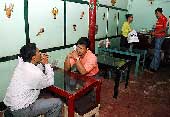 |
| The disabled persons at work on Sunday. Picture by Biju Boro |
May 9: Tea drinkers may differ on whether a cup of Navjeewan can infuse new life into a person, but for the band of disabled workers who blend and pack the product, it is undeniably a lifeline.
At the godown that serves as the workspace of those involved in the Atma Nirbhar-Ek Challenge project, 11 disabled workers toil from nine to five, blending and packaging tea under the brand name Navjeewan. And as each packet goes off the shelf, these workers take one more confident step towards self-reliance.
“Our endeavour is to give the disabled the opportunity to work with dignity,” project co-ordinator Kaushik Das said.
Of the 13 workers who have benefited from the project, seven are hearing impaired, four are physically challenged and two are poor women. The workers have been recruited on contract.
Atma Nirbhar-Ek Challenge is a no-profit, no-loss project for the welfare and economic rehabilitation of the physically handicapped, disabled and underprivileged people through packaging and marketing of tea and spices. It is registered under the Societies Registration Act.
Das said the workers had been packing and market 12,000 kg every month for various organisations, including army canteens, the airforce and hospitals. “As much as 90 per cent of the resources for the project are generated internally.”
Survey data indicate that the Navjeewan brand sells the most in Shillong and Nagaland.
The people behind Atma Nirbhar-Ek Challenge buy tea from the Guwahati Tea Auction Centre, which is the second largest CTC auction centre in the world and was set up in 1970. The packed Assam CTC teas are priced at Rs 60, 90 and Rs 100 per kg.
A widow who has been working with the group said she got her siblings married after finding employment. Another recently got a job in the forest department.
The workers get a monthly stipend, lunch and educational allowance for their children. “I would like to see at least 30 disabled workers benefiting from the project. Those who are working with us now are all satisfied because they are making a positive contribution to society in spite of their disabilities. We have tried to provide them a stress-free environment,” Das said.
On whether the business could become more profitable with better marketing, the project co-ordinator said: “It is better to be small and live within one’s means.”
Das said his organisation had made a beginning, but much remained to be done. “There are virtually no employment opportunities in the city for the disabled. Economic rehabilitation of the disabled is an issue that needs to be addressed urgently.”











